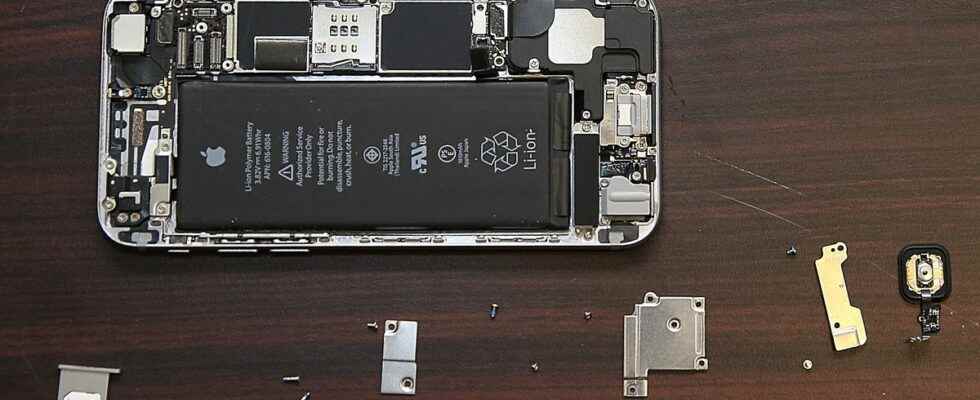On Wednesday, December 7, 2022, the Halte à l’obsolescence programmed (Hop) association filed a complaint against Apple regarding serialization (or pairing). This practice, which consists of associating the serial numbers of components and peripherals with that of the iPhone, in particular via microchips, limits the possibilities of repair, denounces Hop.
The serialization of spare parts, a real problem
By thus certifying the spare parts eligible for repairs, whether batteries, screens, cameras or others, manufacturers – like Apple – ensure that they control the maintenance market for their products. , preventing private individuals or non-approved repairers from having access to it.
Indeed, if the serial numbers of these parts are not recognized by the iPhone operating system, this may have the effect of hindering the proper use of the repaired device (error messages, etc.) . This may even be the case when repairs are carried out with genuine parts. made in Appleperfectly identical to those replaced.
“In many cases documented in the complaint, malfunctions are found when the device is repaired with a part, even identical and original, not authorized by Apple software. These can also be triggered during an update (as in the recent case of a repaired touchscreen on an iPhone XR rendered unusable after the iOS 16 update). While a simple return to iOS 15 can correct this failure, Apple does not allow it, preferring to incriminate a non-original Apple screen which causes a touch problem”describes Hop.
Hindrance to repair and refurbishment
This is a real problem insofar as, legally, serialization can be considered as an obstacle to repair, knowing that it also limits the reconditioning of devices, prior to giving them a second life. Indeed, serialization poses a risk of future malfunctions on refurbished devices sold on second-hand markets.
For Hop’s lawyers, this approach is comparable to planned obsolescence, burdened with misleading commercial practices since the consumer is not clearly informed by Apple. Because yes, the Agec law (Anti-waste for a circular economy) makes illegal any “obstructing repair and reconditioning” outside the approved circuits. are also denounced “barriers to access to spare parts and information, including software, allowing the repair of an iPhone”.
Obviously, the manufacturer benefits from its practices. On the one hand, it discourages the repair or purchase of refurbished smartphones, in favor of new products. On the other hand, when the repair takes place, it is done in a captive market totally controlled by the brand and at high prices. To be convinced of this, just look at the operation of the self-repair service launched by Apple on some of its iPhones and MacBooks, with rental of dedicated tools accompanied by a very high security deposit and purchase of spare parts at full price.
An irresponsible practice
“At a time when Apple prides itself on environmental initiatives, our role is to reveal the scandalous waste that it actually organizes […] If Apple wishes to prevent independent repair and the development of refurbishment, justice must prevent these anachronistic, irresponsible and illegal practices”, declare in turn Laëtitia Vasseur and Samuel Sauvage, co-founders of Hop. And Quentin Ghesquière, president of the association, to add on Twitter as it’s about a “irresponsible practice”. “A smartphone emits 80% of its carbon footprint during manufacturing, and is made up of minerals that have an immense social and environmental impact. It is by using it for as long as possible that we can smooth out its impact and limit extraction”.
This is not the first time that Stopping Planned Obsolescence has filed a complaint against Apple. In 2020, the association had the Californian company fined 25 million euros, following the appearance of disabling slowdowns on old iPhones with worn batteries, after updating the operating system. A case that is still relevant in the United Kingdom.
